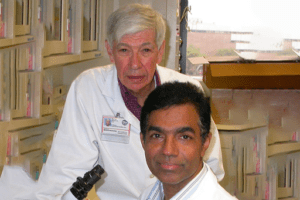
Biological therapy for non-obstructive azoospermia
Non-obstructive azoospermia (NOA) is a condition in which men produce no sperm at all, even though their genital ducts are not obstructed. This can be

Stem cell therapy is a type of treatment that uses stem cells to repair or replace damaged or diseased tissues. In the context of male infertility, stem cell therapy is being investigated as a potential treatment for azoospermia, which is the absence of sperm in the ejaculate.
There are two main types of stem cells that are being investigated for the treatment of azoospermia:
Stem cell therapy for azoospermia is still in the early stages of research, but there have been some promising results. One study, published in the journal Stem Cell Reports in 2018, found that intratesticular injections of MSCs in men with azoospermia led to the production of sperm in some of the participants.
Another study, published in the journal Nature Medicine in 2019, found that iPSCs could be differentiated into sperm cells in the laboratory. These sperm cells were then able to fertilize eggs and produce healthy offspring.
While these results are promising, more research is needed to determine the safety and efficacy of stem cell therapy for azoospermia. Currently, stem cell therapy for azoospermia is not a standard treatment option, but it may be available in some clinical trials.

Non-obstructive azoospermia (NOA) is a condition in which men produce no sperm at all, even though their genital ducts are not obstructed. This can be

He main point of the article “Inhibition of Spermatogonial Differentiation by Testosterone” is that testosterone can inhibit the differentiation of spermatogonia, which are the stem
Prolistem is a Patended Formula, Prolistem statements have not been evaluated by the Food and Drug Administration. This product is not intended to diagnose, treat, cure, or prevent any disease.